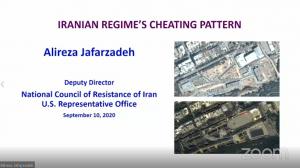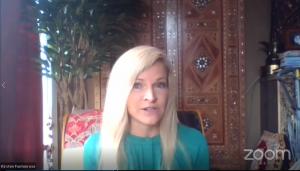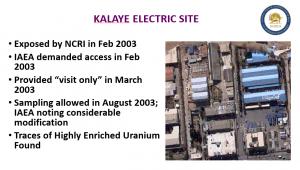
IRAN: Panel Says UN Must Reinstate Sanctions
Cites Tehran’s Malign Regional Conduct, Terrorism, Nuclear Violations since JCPOA
WASHINGTON, DC, UNITED STATES, September 11, 2020 /EINPresswire.com/ -- On Thursday, September 10, 2020, the U.S. Representative Office of the National Council of Resistance of Iran (NCRI-US) hosted a panel of leading national security experts and former officials to discuss the strategic necessity of reinstating UN sanctions on the Iran regime. Entitled “IRAN: New IAEA Report, Terrorism, Belligerence & Need to Restore UN Sanctions,” the panel discussed the disastrous repercussions for regional and global peace and security if the United Nations arms embargo on the Iranian regime, due to expire in mid-October, is not extended.
The panelists addressed the various aspects of Tehran’s regional aggression, whether direct or through proxy militias, its terrorism, assassination of dissidents abroad, missile and nuclear programs and domestic crackdown on the Iranian people. The list of major violations in the damning new IAEA report on Tehran’s commitment to its nuclear obligations was also a central topic of discussion.
Ilan Berman, Senior Vice President at the American Foreign Policy Council and author of Iran's Deadly Ambition: The Islamic Republic's Quest for Global Power; Steven P. Bucci, visiting fellow at The Heritage Foundation and former Deputy Assistant Secretary of Defense for Homeland Defense & Defense Support of Civil Authorities; Kirsten Fontenrose, Director of Scowcroft Middle East Security Initiative at the Atlantic Council and former Senior Director for Gulf Affairs in the National Security Council; and Alireza Jafarzadeh, NCRI-US Deputy Director and author of The Iran Threat, were the panelists. Jafarzadeh also moderated the online event, live streamed on the NCRI-US social media platforms and website.
In his opening remarks, Mr. Jafarzadeh recalled that the sunset clauses in the JCPOA and UNSCR 2231 to gradually ease arms, missile, and nuclear restrictions on the Iranian regime, were based on the notion that the regime’s behavior would gradually change. Over the past five years, however, the Iranian regime’s behavior has not changed and the resolution has not prevented Tehran from striving to obtain the nuclear bomb in violation of its own commitments.
“If anyone is surprised why the stockpile of enriched uranium, according to the latest IAEA report, is now 10-fold higher than what is allowed under UNSCR 2231, they need to take a look at the three-decade pattern of nuclear cheating by this regime. The cheating occurred before, during and after the JCPOA, and continues as we speak.”
At the conclusion of his opening remarks, the NCRI-US Deputy Director shared a presentation, entitled “Iranian Regime’s Pattern of Cheating,” on specific cases of nuclear cheating, as well as lies over the span of three decades to hide the true extent of its secret nuclear program, particularly its military dimensions. He offered specific details on the regime's elaborate hide-and-cheat operations in several cases which the NCRI exposed relying on information provided by the Resistance’s network inside Iran. These sites are, Kalaye Electric, exposed in February 2003; Lavizan-Shian, exposed in May 2003; METFAZ, exposed in 2009; and the Research Center at Parchin, exposed in 2017. Tehran’s most recent hide-and-cheat case is the Abadeh nuclear weapons site.
The panel’s first speaker, Mr. Ilan Berman, analyzed the findings of the new IAEA report, saying, “There has been a massive expansion of Iran’s low enriched uranium stockpile. As you, Alireza, pointed out in your presentation, Iran now has 10 times the legal limit that is set out in the JCPOA. There is also evidence that Iran is installing new advanced centrifuges at its Natanz facility, that it has restarted its heavy water reactor activities, and that it is actively blocking access to IAEA inspectors. That last part has been remedied in recent days, partially, but there are still lingering doubts, as there have been throughout this whole process, about the inability of the international community to see the grand sweep of Iran’s nuclear program. So, the estimated breakout time that experts have concluded from reading this new report is that Iran is significantly closer to what could be called a nuclear breakout, to a situation where Iran can reach a threshold nuclear capability. That window has now narrowed to something like three and a half months, according to organizations like the Institute for Science and International Security.”
Mr. Berman also discussed the current debate at the UN Security Council about the United States’ legal right to call for “snapback” of all UN sanctions, saying: “You can go back and look at the language of the JCPOA itself, and the parallel UN resolutions that were passed, but the legal language is very clear that the participants, the original participants to the 2015 nuclear deal have the right to say that Iran is not in compliance with its provisions and have the right to ask for a snapback, and the United States has done so… The IAEA findings come amid this debate over snapback, and that makes it increasingly difficult for the UN to simply maintain the status quo, to assume that the U.S. doesn’t have a case to be made.”
He explained that “next week, September 19th, once 30 days have passed from the initial U.S. submission of the request for snapback, the international community can either act or the U.S. can act unilaterally. There is a great deal that the United States can do unilaterally. There are provisions of the 2017 CAATSA Act, the Countering of America’s Adversaries through Sanctions Act, that have not been applied yet, that can be applied unilaterally . . .There is a tremendous amount more that the U.S. can unilaterally do to increase pressure on Iran and impose costs on Iranian behavior.”
Responding to a question about the views of people in the streets of Iran toward the regime and the international sanctions, Mr. Berman explained that “it’s necessary to understand that what we’ve seen over the last two and a half years since December of 2017 in terms of the protests, in terms of the social uprisings, the persistent unrest that you’ve seen on the Iranian street represents a fundamental rejection, not of international pressure, but of the Iranian regime itself… Candidly speaking, what we’re seeing over the last two years is much more profound. It has much more staying power and activates more levels, more strata of Iranian society. The Iranian regime was given a little bit of breathing room this year as a result of the coronavirus pandemic … but in recent weeks, you’ve seen those protests re-emerge because the underlying dissatisfaction with the Iranian regime, with its stewardship of the country, with the fact that it consistently prefers guns over butter, it doesn’t provide money for grassroots prosperity, it provides money for foreign adventures, all of that is there, sort of baked into the protests that you’re seeing on the Iranian street… The conditions within Iran are being amplified by international pressure, but the primary grievance is internal to Iran. It is a grievance between the Iranian people and the regime itself, and I think that’s necessary to point out.”
The next speaker, Ms. Kirsten Fontenrose, opened her remarks by debunking the fallacy among some analysts which effectively makes light of the lifting of the arms embargo by arguing that Tehran “does not have the funds or the inclination to acquire large weapons systems and will therefore not pose a greater threat to its neighbors or the world.” She said: “This analysis ignores three things. First, Iran has flirted with the purchase of Russian S-400s or S-500s, national level combat systems. Second, that Iran’s primary foreign policy tool is the deployment of armed proxies. Arming and equipping small, unconventional militias requires troop-level combat systems, and lifting the embargo will make it easier for Iran to acquire and transfer weapons it currently must smuggle. Third, that Iran’s modus operandi is to upgrade the components of existing weapons systems instead of acquiring new ones, so the intended strategy may not be to procure large systems, but to amend what they already have, with leap-frogged technologies.”
The former National Security Council director stressed that “Tehran has demonstrated a preference for supporting the IRGC above other priorities” and is “committed to extra-territorial destabilization of the region… Iran has protected its proxy and ballistic missile programs from the slow starvation suffered by other sectors under sanctions. It is predictable that the regime will continue to move funds from other budgets to purchase additional weapons if they are permitted to do so by the international community ending the embargo.”
Saying that “Europe should investigate whether IRGC plans like the Paris bomb plot of June 2018 will be more dangerous if the IRGC has access to advanced weaponry,” she added that “if the embargo is not extended, the US will apply sanctions on any company that provides even a screw to the Iranian domestic weapons manufacturing sector. So, companies across the world that sell to IRGC front companies involved in arms trade or manufacturing will be unable to do business.”
Ms. Fontenrose concluded her remarks stressing that “as long as the regime in Tehran is able to exploit the differences in opinion between American and European interlocutors, they will continue to push the limits of international law.”
Lauding the NCRI-US for hosting the series of panels on the “threats posed by the Iranian regime” and the imperative to reinstate UN sanctions, the last speaker, Mr. Steven Bucci,told the panel that “the Iranian regime conducts foreign policy and diplomacy by terror… Their main way of conducting business with the community of nations is through terror. They will use their proxies to do the dirty work all over the world, to assassinate people, to threaten regimes and try to destabilize governments… The IRGC Quds Force is almost unique in its role in foreign affairs. The only real analog to it are my old enemies, the Soviet Spetsnaz, who were deployed around the world, working with other countries to do the same things, to assassinate, to destabilize regimes, to be that outreach of the Soviet government. The Quds Force does the same thing for Iran now, even with the elimination of General Soleimani, who was really the force behind it and many experts opine that he was actually the most powerful guy in Iran because of what he did and how he did it and the influence that he had.
“The elimination of Soleimani was an incredible victory for the oppressed people of Iran, for the Muslims across the region, as well as any country that loves freedom and wants to see this kind of behavior stopped. He was not a diplomat. As a military leader sent into a foreign country and then directing offensive actions in that country, he was a legitimate and legal target when he was eliminated… This man was playing a role that made him a legitimate target and he was in fact eliminated for that reason.”
The former Deputy Assistant Secretary of Defense concluded his remarks by saying that “We have not exerted maximum pressure on Iran. There is a lot more we could do. We really need to squeeze them now, more than we ever have before, particularly with the evidence that they completely ignored the restrictions on their nuclear program, they’ve ignored the restrictions on their ballistic missile programs, and they’ve never stopped doing the terror part of it. All three of those areas need to be targeted by us, using economic and diplomatic means for now, but with an eye on the fact that if those don’t work, we’re going to have to take it to the next step.”
Alireza Jafarzadeh closed the session by saying that since the JCPOA agreement in 2015, “the malign behavior of the regime externally or inside Iran has not been tamed. To the contrary, the Iranian regime, in addition to being in significant non-performance with its nuclear commitments, has heightened its regional aggression, stepped up terrorism in Europe and the United States, and cracked down on its population in Iran.
“We have seen a sharp rise in the Iranian regime’s violations of human rights in Iran, as a number of protesters who were arrested over the past two years are now under torture. Amnesty International’s new report states the regime created a torture epidemic, including extracting protesters’ fingernails, electric shocks, waterboarding, forced injections, and mock executions. Some have already been sentenced to death, like the decorated wrestler, Navid Afkari, a clear sign that the vulnerable regime is afraid of its own population, who seek nothing but a free Iran.
“The experience over the past four decades has shown that concessions only embolden the regime. Therefore, building more pressure on the regime is indispensable to confronting its terrorism and aggression, as well as its attempts to obtain nuclear weapons.
“Instead of giving arms to the IRGC, that entity along with its Qods Force must be disbanded. The mullahs already have an army of their own, and the money and resources of the IRGC should go to improve the lives of the Iranian people, not to mention fighting the COVID-19 pandemic which has taken the lives of more than 100,000 Iranians in over 400 cities across Iran.
“It is for this reason that we, on behalf of the people of Iran, reiterate our long-standing call for the reimposition of the six UN Security Council resolutions sanctioning the Iranian regime. Instead of arguing in favor of the regime, the world must recognize the right of the Iranian people to rise up against their ruthless rulers. Instead of giving concessions, the regime’s leaders must be put on trial in international tribunals for the massacre of 30,000 political prisoners in 1988, the murder of 1,500 protesters in November 2019, and the terror plots against and assassinations of Iranian dissidents abroad. By holding the regime’s leaders to account, the world can pave the way for a free Iran.
“Imagine a free Iran, where the ballot box is the only criteria for legitimacy, people can speak freely, there is gender equality, there is separation between mosque and state, where the nation would call for peace and co-existence with the neighboring countries instead of funding terror, and where the resources are used for the prosperity of the people instead of nuclear weapons.”
# # #
_____________________________________________
These materials are being distributed by the National Council of Resistance of Iran-U.S. Representative Office. Additional information is on file with the Department of Justice, Washington, D.C.
NCRI-US
National Council of Resistance of Iran - US Rep. Office
+1 202-747-7847
email us here
EIN Presswire does not exercise editorial control over third-party content provided, uploaded, published, or distributed by users of EIN Presswire. We are a distributor, not a publisher, of 3rd party content. Such content may contain the views, opinions, statements, offers, and other material of the respective users, suppliers, participants, or authors.









